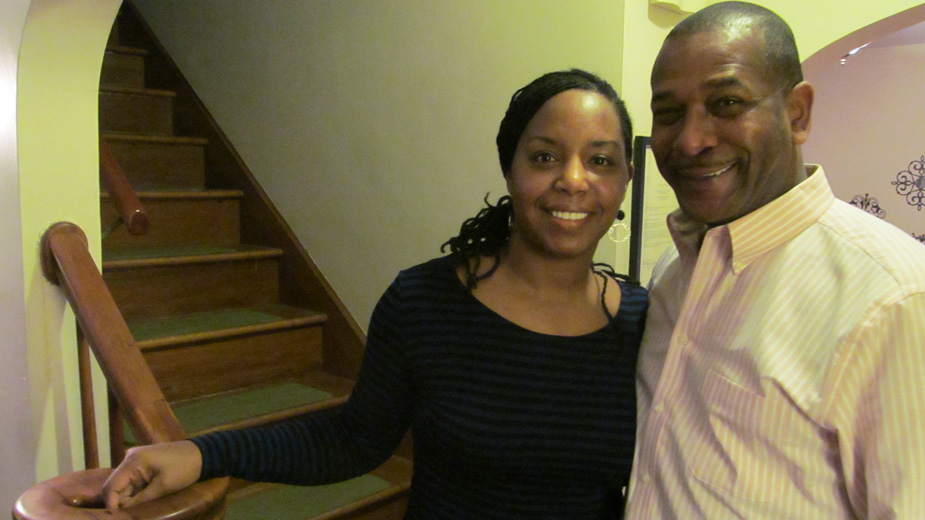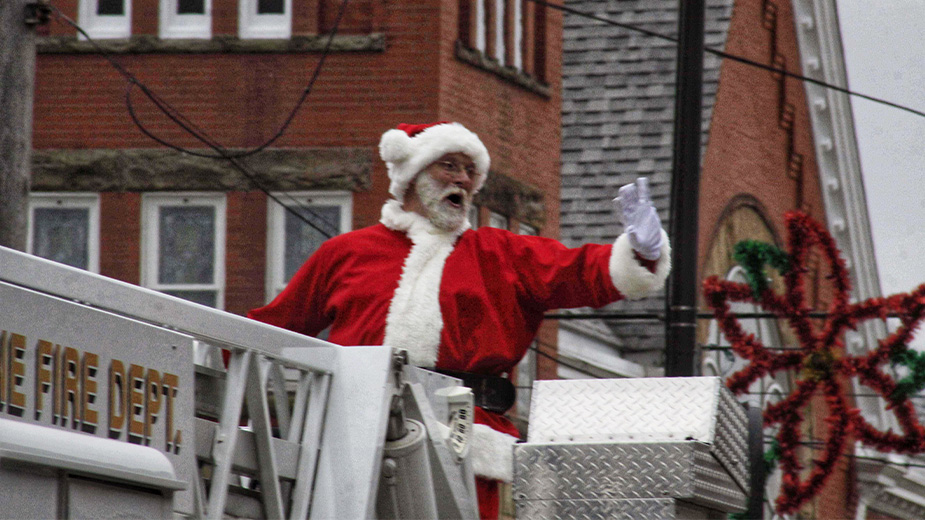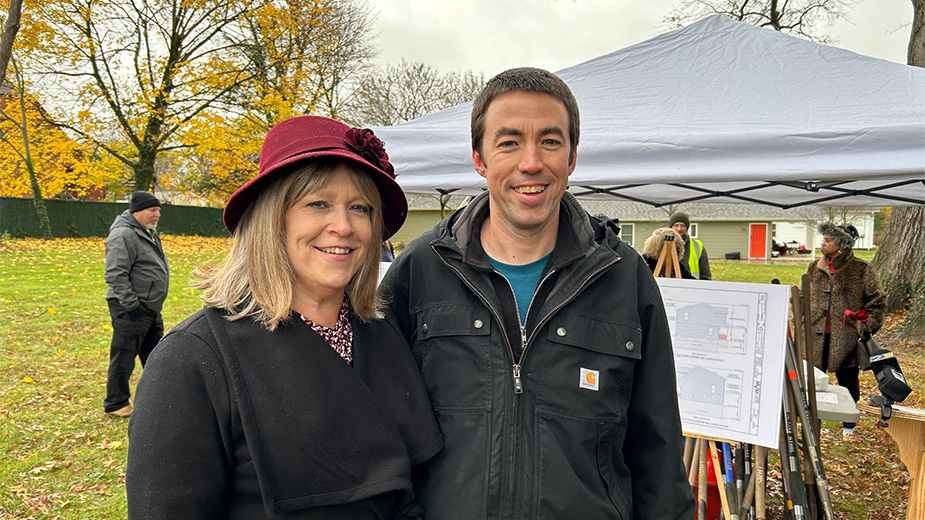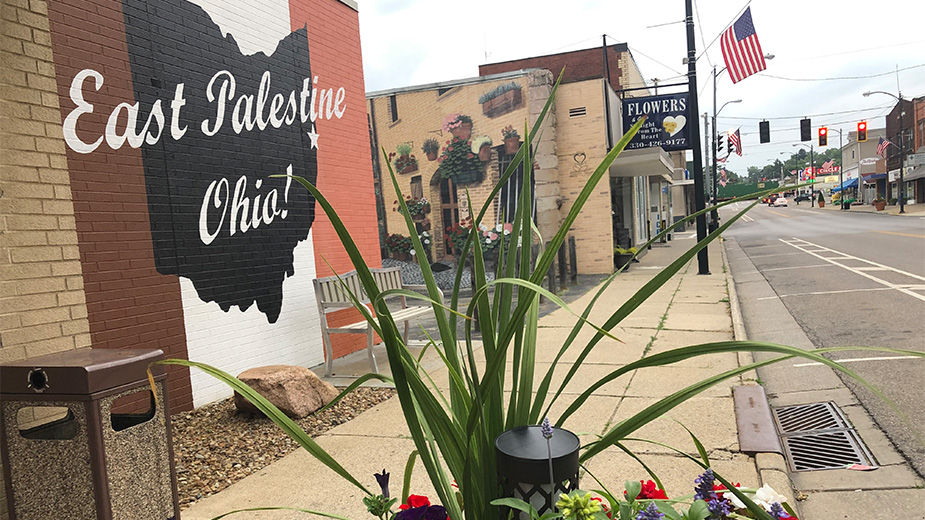‘Most Intriguing’: Franklin Studies, Makes History
WARREN, Ohio – Scattered throughout the mayor’s office in Warren City Hall, on shelves and bookcases and mantels and the walls, are mementos from Doug Franklin’s career. Pictures of the second-term mayor with veterans, with his son and Jim Tressel, with police officers and with his wife, are tucked between books, proclamations and, most noticeably, awards.
Franklin has awards from Beatitude House – for rappelling down the edge of First National Tower in downtown Youngstown last summer – from New Vision Christian Ministry, from the Omega Psi Phi fraternity and the Frederick Douglass and Sojourner Truth Award for Courage from the Marcus Garvey Institute of Awareness.
Douglass, the mayor begins, is his favorite historical figure. But it’s not the award bearing his hero’s name that tops the list for Franklin.
Every year, the street where Franklin grew up, Homewood Avenue SE, throws a block party. After he took office, the residents presented him with an award of their own. That black plaque has a picture of Franklin engraved above several lines on how proud the neighborhood is of him.
“It’s on the mantle in my office, right in the center,” the mayor says with a smile. “They disciplined me, encouraged me, watched out for me and taught me the importance of neighborhoods. It’s one of the most heartfelt awards because it’s from people who know me and have no other motive other than saying, ‘We’re all proud of you.’ ”
Those years on Homewood are what set Franklin on his path to become mayor and along the way his definition of family changed. Family became more than just his father and mother, siblings and aunts, uncles and cousins.
Over the years that family expanded to encompass immediate neighbors, then others who lived on the street, then those on adjacent blocks, until Franklin held everyone in the same regard as his family, says Michael Keys, the city community development director.
“I think that’s where the love of politics came from,” Keys says. “He took that immediate family and kept adding to it. When Doug looks at Warren, I don’t think he looks at it and says, ‘I’m the mayor of all these people.’ He looks at it as a continuation of his family.”
Franklin’s father, a coal miner, moved to Homewood Avenue in Warren from Cabin Creek, W.Va., before Doug was born. It was there he instilled a valuable lesson that the mayor has held tight.
“My dad used to tell me that if you can’t take care of your family, you can’t take care of a community,” he says. “I schedule things around my family time. Family comes first.”
It comes first today just as much as did during his first run for mayor when he was engaged to his wife, Kenya. There were challenges, she says, in balancing their time together against Doug’s campaign stops, but they managed.
“It was a challenge, with my youngest son Kane in high school trying to make all of his events and football games as we were going to our own events,” she says. “This year has been a little easier with him in college, so it’s easier to be at all the things people expect you to be at and not miss anything.”
Franklin’s predecessor as mayor, Michael O’Brien saw that trait not long after they met in 1983 when Franklin ran for precinct committeeman in Warren.
“Doug is, in business and in life, about God, family and country,” O’Brien says. “And he’s always emphasized those three things enormously.”
O’Brien, today representing the state 64th district (Warren) in Columbus, elaborates, “Doug is not just a father, but the baseball coach and the dad at the Y with his son. If there were five parents at a baseball game, one of them would always be Doug Franklin.”
It was Doug’s sense of family that first attracted Kenya, she says. The first time they met, at Kenya’s church, Doug was with his son Jamal, who has special needs.
“I remember thinking that he was not only handsome, but being very gentle with his son,” she says. “Family is very important. That’s one of the things that we both have in common. … At the holidays, we see his mom and then we go see my mom. There’s no trading off. It’s both of them.”
That value shows up in the décor in the Franklin household on the north side of Warren. No replicas of art are on display, only pieces Kenya painted and family pictures, both new and old.
The belief that family extends beyond blood relatives also is evident. In one corner, a picture of grasshopper taken by Rachel Hathhorn, Franklin’s secretary, hangs next to the sunroom entrance. On the bookcase next to that entrance is a caricature of Franklin and some of the city’s former mayors drawn when he was mayor-elect.
On the shelves beneath are books, most of them on history and most of them Doug’s. History is his passion, he says, especially the Civil War and Abraham Lincoln, in addition to Frederick Douglass, because “of all the challenges they faced in their lifetimes.
“I love history. I really geek out on history,” he says. “It’s my passion and it always has been.”
Bookcases sit throughout the Franklin home, each one full and divided between Doug and Kenya’s collections, but their personal libraries aren’t limited to those shelves. The visitor can easily see books stacked on end tables, nightstands, desks and shelves everywhere.
Beyond books, Franklin has other escapes from life as a public official. He’s frequents the tennis courts at Packard Park and although he doesn’t play often, the mayor does keep a racket and change of clothes in his car, he says.
He also enjoys crossword puzzles – he refuses to use the Internet to look up answers. Sometimes Kenya does and provides hints, she says. And he visits the gym and attends church.
Another recent trend for decompressing after a day of work, he says, has been comedy, most often Witty Soul Comedy Radio on Live365.com. Working at City Hall, he quips, requires a sense of humor to get through the day.
“Michael O’Brien’s
son, who was three when I started working in
City Hall, couldn’t say it right as kids do and appropriately called it ‘Silly Hall,’ ” Franklin says. “There have always been instances that happen every day that I’m sure could make one of the best sitcoms on TV.”
With his interest in history, Franklin made some himself when he won the 2011 mayoral election, becoming the first black mayor of Warren, an accomplishment not lost on him. He notes that before it became City Hall, the Perkins Mansion was a stop on the Underground Railroad.
“It’s great knowing that and knowing that there were servants in this house who probably weren’t that far removed from slavery,” he says. “Working here as a mayor – there’s a great satisfaction to know, as a country and not just as a person, just how far we’ve come, and I’m a beneficiary of that progress.”
When he ran for mayor, Franklin says he knew that if he won, he’d make history, but it wasn’t a driving force behind the decision to run.
“It was in the back of my head, but never in the forefront of my plans. The plan was always just to be a public servant,” he says. “I never had any burning desire or dream to be the first African-American mayor, or to even be mayor. I just wanted to be of service.”
As mayor, Franklin has attended the annual United States Conference of Mayors meetings in Washington, D.C., every year since being elected. The trips afford him a chance to visit some of his favorite places outside his home city.
The Smithsonian Museum of American History is a must for him and Kenya, Doug says, because of the exhibit on presidents. They spend more time at the Lincoln exhibit than any other he says, and make it a point to visit Ford’s Theatre and the Petersen House, where Lincoln died.
There’s another stop he always makes.
“Sitting on the steps of Frederick Douglass’ home, overlooking the rest of D.C., is a great place,” the mayor says.
“It’s a beautiful home and when you consider how it sits and looks over the capital. For a runaway slave to accomplish what he accomplished, it’s really encouraging and enlightening and inspirational.”
For the lifetime resident of Warren, the work accomplished in his city also provides a source of inspiration. Most has been accomplished in recent years by community groups such as the Trumbull Neighborhood Partnership or smaller organizations such as Community Service Inc., which he helped start in his neighborhood before his election as mayor.
“It’s encouraging. I’ve been in public service since ’90 and to see the public participation go to a new level is amazing,” he says. “We’ve been purposefully trying to get citizen involvement through neighborhood associations because they’re valuable to everything we’re about as a community.”
Since Franklin took office, groups such as TNP have increased their reach greatly and worked to put a new face on the city. They’ve countered the premise that Warren is just another Rust Belt town with little beyond vacant lots and empty factories, the mayor says.
As time allows, Franklin shows up to lend a hand, helping with block cleanups and planting projects, attending demolitions of abandoned houses and celebrating the sale of refurbished homes.
“The mayor’s everywhere. If you have a block cleanup, he’s there. If you’re pounding a nail, he’s there. If you’re planting flowers, he’s there,” Keys affirms.
All of that work in neighborhoods is part of Franklin’s effort to rebuild Warren into the city he deeply believes it can be, his wife notes.
“Everyone wants the Warren that used to be, but it won’t be like that because we don’t have the things we used to have,” Kenya says. “It’s about building a new image and new industries like technology.”
Both of her parents worked at Packard Electric, Kenya notes, as did many people she grew up with.
“It was either there or GM or GE,” she continues. “But it’s a different time. We can’t be what we used to be,” she says. “We can be better and we can be different.”
During Franklin’s first term, the Tech Belt Energy Innovation Center and Eastern Gateway Community College moved into downtown, while companies such as Laird Technologies, Warren Design & Build and Patriot Homecare moved to town or set up shop. And last year, Velfera Auto Design and Auto Parkit announced that they could be moving in, bringing advanced manufacturing.
With that influx, the traditional manufacturing that sustained Warren for so long is still part of the city’s future as is the addition of new companies. “We haven’t given up on manufacturing. That’s what we’re doing with the Golden Triangle. Our plans are based on retaining those 3,000 jobs,” he says.
“The future of Warren is bright. We’re in the process of rebranding ourselves and you can see it with the types of jobs and businesses we’re attracting.”
With the addition and retention of those businesses, Warren seems to be on a brighter path. Throughout his career, that seems to be what Franklin has cared about.
“He cares deeply about the city he grew up in,” says development director Keys. “What struck me when I met him was how much cared. It’s important to him. His neighborhood is important to him. His family is important to him.”
As he reflects, Franklin says it’s the days on Homewood Avenue that nurtured his a sense of community, extended family and duty that underlies all he does as a public servant.
“Some people think it’s a rough neighborhood, but it isn’t,” the mayor says. “There’s very little crime and people look out for each other. I’m very proud of that neighborhood. … A lot of those people shaped my life in a lot of ways. There’s no doubt in my mind, looking back, that I was blessed to have been able to find my way, but it wasn’t preordained. It just kind of happened.”
Pictured: Family comes first for Kenya and Doug Franklin. For the mayor and his wife, family means the entire city of Warren.
Copyright 2024 The Business Journal, Youngstown, Ohio.



